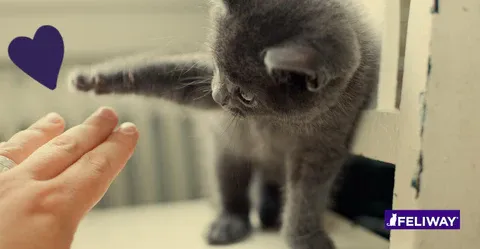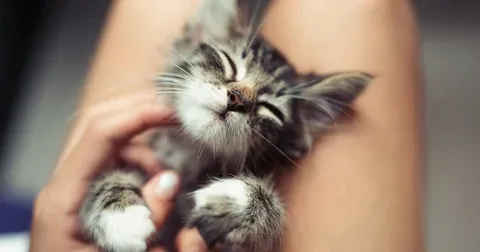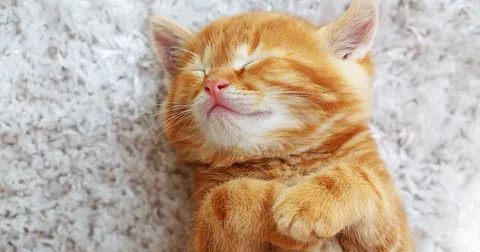Does your playful kitten sometimes get too excited and leave you with unexpected bites or scratches? While a little play biting is normal for young cats, it’s crucial to train them early to prevent these habits from turning into problems as they grow. Learning how to stop kittens from biting and scratching ensures safe, enjoyable interactions with your furry friend. This guide shares expert-backed tips to redirect their energy, promote good behavior, and create a harmonious home.
For more on managing kitten behavior, check out how to discipline kittens for biting.
1. Redirect Playful Energy to Toys, Not Hands or Feet
Kittens are natural hunters, and their pouncing instincts often target moving hands or ankles. To stop kitten biting and scratching, teach them that only toys are fair game. When your kitty lunges, firmly say “No!” in a sharp tone, offer a toy like a feather wand or ball, and pause play for a couple of minutes.
Never encourage hand-playing, as it reinforces the habit. Opt for interactive toys on a string or wand to keep distance between you and their claws. According to veterinary behaviorists from the American Association of Feline Practitioners (AAFP), consistent redirection during play helps kittens distinguish between toys and humans, reducing injury risks as they mature.
 cat scratching post for kittens
cat scratching post for kittens
2. Guide Them to a Scratching Post
Scratching is an innate cat behavior for claw maintenance, stretching, and territory marking. During play, kittens practice these skills, but directing it toward you isn’t ideal. Spot pre-pounce signs like dilated pupils, twitching tail, or flattened ears, then gently redirect to a scratching post or toy.
Provide one post per cat plus an extra in multi-cat homes, placed in high-traffic areas. Reward use with treats or praise to build positive associations. Experts recommend sisal or cardboard posts over carpeted ones to match their preferences.
 litten play and scratching
litten play and scratching
3. Immediately Stop Play and Ignore Aggression
Excessive biting or scratching signals overexcitement. Respond by ending interaction right away—stand up, walk away, and ignore your kitten for 5-10 minutes without eye contact or talking. This timeout teaches that rough play ends fun time.
Kittens learn fastest during their socialization window (2-7 weeks), but consistency works for all ages. Pair with positive reinforcement for gentle play, staying calm to avoid escalating fear-based aggression, as advised by the ASPCA.
4. Use Your Voice Effectively
A firm “No!” or “Ouch!” in a calm, high-pitched tone mimics a littermate’s yelp, signaling discomfort without scaring your kitten. Combine it with withdrawal for stronger impact, but never yell—this can heighten anxiety.
Resume play after calming, praising soft paws and gentle bites. Patience is key; most kittens respond within days to this vocal cue method endorsed by cat behavior specialists.
 cute kittens
cute kittens
5. Schedule Daily Play Sessions
Kittens have bursts of energy needing outlets. Short 10-15 minute sessions, 2-3 times daily, using toys like laser pointers or tunnels, burns off zoomies and strengthens your bond. Teach calm play by slowing interactions as energy wanes.
Routine prevents frustration-fueled bites. Vets note understimulated kittens often bite from boredom, so consistent play fosters better manners.
6. Never Reward Unwanted Behavior
Even negative attention like scolding can reinforce biting if it prolongs interaction. Always disengage fully—pets crave connection, so isolation discourages repeats. Track progress; habits fade with unwavering consistency.
 kitten health
kitten health
7. Rule Out Health Issues
Persistent aggression might stem from pain, like dental problems or infections. Schedule a vet check if biting escalates suddenly. Early detection ensures it’s behavioral, not medical, per guidelines from the World Small Animal Veterinary Association (WSAVA).
 calm kitten
calm kitten
8. Foster a Stress-Free Environment
Anxiety amplifies scratching and biting. Ensure ample resources: litter boxes (n+1 rule), vertical spaces, quiet zones, and stable routines. Products like FELIWAY Optimum diffusers mimic calming pheromones, reducing stress-related behaviors as clinically proven in studies.
For bonding tips, explore train cat to cuddle.
Mastering how to stop kittens from biting and scratching requires patience and positivity. By redirecting energy, ignoring bad habits, and enriching their world, you’ll raise a gentle companion. Consult your vet for tailored advice, and enjoy playful sessions worry-free. Share your success stories in the comments!
References
- American Association of Feline Practitioners (AAFP) Behavior Guidelines
- ASPCA Cat Behavior Resources
- World Small Animal Veterinary Association (WSAVA) Wellness Protocols
- FELIWAY Clinical Studies on Pheromone Diffusers
